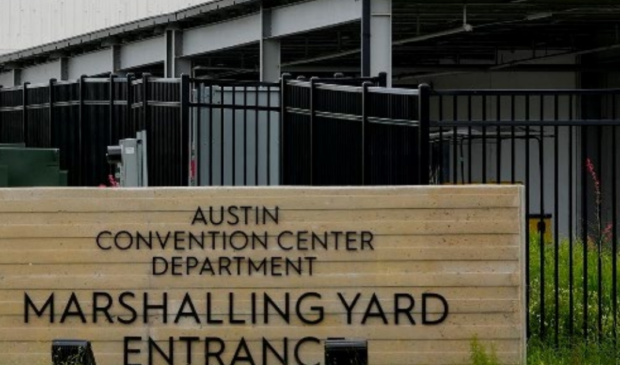Public Health Committee weighs Marshalling Yard complaints, McKinsey homelessness study
Friday, February 9, 2024 by
Emma Freer Members of Vocal-TX, a grassroots organization that represents low-income people directly impacted by homelessness, and other Austin residents raised concerns about City Council’s handling of homelessness at the Public Health Committee meeting on Wednesday. Their concerns centered on Marshalling Yard, the city’s new temporary emergency homeless shelter, and a recently approved $2 million contract with McKinsey & Company to assess related Austin-area services, spurring committee members to ask city staff to bring the contract back to Council for further review.
Gloria Chapa, wearing a Vocal-TX T-shirt, told committee members she has lived at the Marshalling Yard for five weeks, during which she said she has experienced shelter staff treating residents unfairly, security guards ignoring safety threats, violence, substance use and unsanitary conditions.
“I’ve got liver cancer, and I don’t want to die there,” she said, her voice breaking. “And it would be nice if somebody would care about how we live.”
Carmen Llanes Pulido, the executive director of Go Austin/Vamos Austin, a local nonprofit focused on improving health equity in the Eastern Crescent, urged the committee to reconsider the McKinsey contract and reallocate the funding to rental assistance or other interventions that could help people experiencing homelessness.
“This particular company has no trust,” she said. “Why? Because those of us who have been hurt by the privatized immigration incarceration system. Those of us who have lost people to the fentanyl crisis. Those of us who have watched our neighbors evicted from apartments to build expensive, dense units. … I urge you all to look at this company and its history of getting involved and creating problems that it then comes in to get big contracts to assess how to solve.”
Shelter update
Homeless Strategy Officer David Gray presented an update on the Marshalling Yard and the city’s cold weather shelter operations as well as efforts to improve conditions.
The Marshalling Yard has been at capacity – 300 residents – for the past couple of months, and the average stay is 70 days, he told commissioners. Residents who have left the shelter have done so largely for unknown reasons before staff have been able to conduct an exit interview. Between the shelter’s August opening and mid-January, 11 percent of residents have exited into permanent supportive housing or some other housing opportunity.
Gray also addressed the complaints from shelter residents and Vocal-TX members, which include frequent and seemingly arbitrary discharges, inadequate post-shelter housing support, poor food quality and limited bathroom and shower facilities.
“I’m very proud that our office has a track record of working with Vocal-TX and other organizations to identify challenges that are happening in our shelters and the work to fix those challenges,” he said, citing ongoing contract negotiations to improve shelter meals.
District 9 Council Member Zo Qadri, who serves on the committee, said public comment confirmed his concerns about the shelter.
“I voted against the Marshalling Yard (last July) because of a lot of the concerns that were brought up, and my hope was that I was wrong,” he said. “Unfortunately, there’s a lot of work to be done to make sure that this project is up to standard for the folks who live there, for the folks that it affects.”
McKinsey contract
Committee members also heeded public comment regarding the McKinsey contract following a collapse in funding.
Late last month, Travis County Commissioners Court rejected a proposal to contribute $400,000 toward the $2 million study and chose instead to conduct its own review of county homelessness services, as the Austin Monitor recently reported.
Interim City Manager Jesús Garza defended the contract and said the city would have to pay only “a fraction” more than its original $1 million commitment, if anything, as a result of the county vote.
“I’m sure the Council would want to have this information” – from the study – “so that when you make policy choices for (the) Fiscal Year ’25 (budget) you’re investing the dollars in the areas that will be the most effective to achieve the best results for our community,” he said.
But committee members, including chair and District 2 Council Member Vanessa Fuentes, wanted more information and input.
“My support for the McKinsey contract was based around that this was a joint venture, that Travis County would also be helping fund,” she said. “Given their change in stance … I have some concerns about the city putting (in) more than $1 million.”
District 5 Council Member Ryan Alter went further, asking city staff to bring the contract back to Council.
“The lay of the land has changed since we approved that contract,” he said. “And I think it’s important that we understand as a council what … this money’s going to be spent on.”
The Austin Monitor’s work is made possible by donations from the community. Though our reporting covers donors from time to time, we are careful to keep business and editorial efforts separate while maintaining transparency. A complete list of donors is available here, and our code of ethics is explained here.
You're a community leader
And we’re honored you look to us for serious, in-depth news. You know a strong community needs local and dedicated watchdog reporting. We’re here for you and that won’t change. Now will you take the powerful next step and support our nonprofit news organization?









